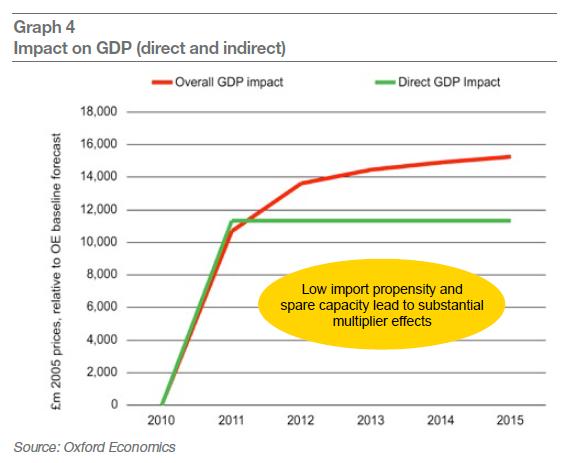Does building 100,000 homes contribute one per cent to GDP?
The most harmful inaccuracies are often those that get uncritically repeated time and time again.
So quite naturally a few eyebrows have been raised over a much-repeated figure used by the Department for Communities and Local Government (DCLG) in recent months, that every 100,000 homes built gives a one per cent boost to UK GDP:
"Every 100,000 homes gives you one per cent of GDP"
Grant Shapps, BBC Today Programme, 23 August 2012
"Peter Schofield, a senior civil servant at the department DCLG, told a recent housing industry conference that building 100,000 more homes a year would add 1 per to GDP"
Financial Times, 13 August 2012
"Every 100,000 new homes built added 1% to total GDP. There should be more innovative use of land and other assets."
Pat Ritchie, Chief Executive, Homes and Communities Agency, June 2012
The claim has been used and re-used by the DCLG for several months now, yet on no occasion was any obvious source for the claim cited.
Full Fact was naturally intrigued.
After contacting the Homes and Communities Agency, they helpfully directed us to a research paper by real-estate service provider Savills entitled: The Case for Housing: The impact of house building on the UK economy.
That paper, published back in 2010, provided the same claim:
"100,000 new homes would... Impact positively on the growth of GDP...
"At a time when the wider economy is restrained and growth limited, a boost to the construction industry would feed through to the headline rate of growth and do much to lift further expectations of growth. This level of increased housing output could add 1% of growth to the economy (by the end of the second year)."
To illustrate this, they provide a graph sourced from economic forecasters and consultants Oxford Economics:

Getting from what the graph shows to the one per cent of GDP claim isn't difficult to work out. Back in 2005 (the prices used in the graph), nominal GDP could be put at around £1.2 trillion (£1,200 billion) whereas it's now closer to £1.5 trillion.
The graph shows the estimate that, after one year of the houses being started, the direct GDP impact is just under £12 billion (12,000 on the axis, in millions), with 'indirect' impacts boosting the gains to a growing extent over the five years. £12 billion is about one per cent of £1.2 trillion.
However while the internal logic of this makes some sense, little else - at this stage - does. The report doesn't explain the graph nor is there any data available which might give us an insight into how the figures are calculated.
So Full Fact has got in touch with Oxford Economics to see if they will provide the raw numbers and the methodology behind the calculation. Until that is provided, this graph is the best we've got to go on to substantiate the Government's claims.
UPDATE (17 September 2012)
After making contact with Oxford Economics, we were informed that the authors of the report have retired and that no one remains at the organisation who is able to explain the figures.
This is obviously a serious problem given how widely the claim is now being used. However, we were able to find some figures from the Office for National Statistics (ONS) that add credibility to the claim.
The ONS calculate the economic contribution of various sectors of the economy on a quarterly basis and publish these in the Blue Book. The latest figures for 2010 show that newly built private sector dwellings contributed £17.7 billion to UK GDP. Total GDP was worth around £1.3 trillion in 2010.
In other words, private sector building accounted for around 1.3 per cent of GDP in 2010.
Housebuilding statistics from the Department for Communities and Local Government (DCLG) meanwhile show that, in 2010, just under 137,000 private sector dwellings were completed.
So, crudely speaking, around 137,000 newly built dwellings contributed 1.3 per cent to GDP in 2010. This would work out as 105,000 contributing one per cent to GDP.
Obviously, without information from Oxford Economics we can't be more than relatively crude when arriving at an estimate based on the ONS data. The latest estimate does not account for the 'indirect' GDP benefits claimed by the original research, nor can we account for non-private sector homes.
Nevertheless, the data we do have suggests that a 1 per cent GDP estimate for 100,000 new homes could be a reasonable one. Whether Oxford Economics' own methodology checks out is something seemingly no one is able to check.